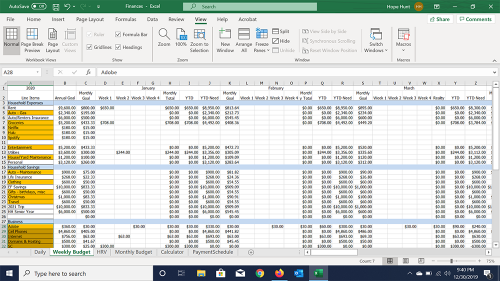by Sara S
When we get together with my in-laws for the holidays, my husband likes to bring his poker chips to play with his brother—never for money, always for bragging rights. My mother-in-law doesn’t like it, and I never understood why. It’s just some harmless gambling, right?
Then I learned that throughout her childhood, her dad—a charming, kind, funny man we all loved—hid a gambling addiction from his children. His gambling problem affected their finances, his health, and her parents’ marriage. My mother-in-law didn’t learn about it until she was an adult, and now, understandably, gambling is no joke to her.
With our own debt on my mind, I’ve been thinking about how some gambling leads to debt. The Economist reported that gamblers in the U.S. lost $116.9 billion in 2016, mostly in casinos and lotteries. According to Debt.org, as many as 23 million Americans go into debt because of gambling, and the average loss is estimated to be around $55,000! The average debt generated by a man addicted to gambling is between $55,000 and $90,000, and women gamblers average $15,000.
Gambling is even more accessible today than when my husband’s grandpa was struggling in the ‘60s and ‘70s. Electronic gambling is growing and some form of gaming is legal in 48 states. It’s possible to be a casual gambler, of course. But the National Council on Problem Gambling states that 2 million U.S. adults are estimated to meet criteria for pathological gambling.
The APA defines gambling disorder as “repeated problematic gambling behavior that causes significant problems or distress.” These are people with addictive symptoms as real as those of an alcoholic or drug addict, and their emotional struggles have scary financial consequences.
So How Can Gambling Lead to Debt?
Borrowing to Keep Gambling
A compulsive gambler will go to extremes to keep playing. They’ll take great financial risks like taking money from savings accounts, investment accounts, or retirement funds. According to Debt.com, 90% of those suffering from gambling addiction withdraw cash advances from their personal credit card accounts in order to gamble. They’ll also borrow money from family and friends, justifying it by thinking they’ll win it all back. When that money is all gone, they can be left with literally no way to pay back their loans.
Taking Time Off Work to Gamble
Addicts can also miss work to gamble for reasons like hoping they can win lost money back or just needing the numbing feeling of the game. Missing work can mean lost wages and eventually a lost job, compounding their debt problem.
Betting Larger Amounts to Overcome Gambling Losses
For a gambling addict, greater losses breed a need to bet larger amounts and to take greater risks to get their money back. But even a large win will just encourage a compulsive gambler to take a bigger risk again, often leading to another significant loss. With all these losses, it’s no surprise an addictive gambler is stuck with debts they cannot pay.

The Gambling Industry Wants People to Lose
Gambling is a for-profit business for both private enterprises and state governments, and they don’t care if you go into debt. Casinos make a profit when gamblers lose money, and according to a shocking 2016 article in the Atlantic, “The business plan for casinos is not based on the occasional gambler. The business plan for casinos is based on the addicted gambler.” They lure in addicts with freebies and gifts, encourage them to stay longer, and offer casino credit to gamblers even when they’ve run out of money. It’s cruel. The more these addicts gamble and lose, the more the casinos win.
Billionaire and businessman Warren Buffet is a vocal critic of gambling. He hates to see the government collect on its citizens’ poor choices: “I’m not a prude about it, but to quite an extent, gambling is a tax on ignorance. You just put it in and guys like me don’t pay the taxes—it relieves taxes on those who don’t gamble. I find it socially revolting when a government preys on its citizens rather than serving them. A government shouldn’t make it easy for people to take their social security checks and [waste them pulling] a handle.”
If compulsive gambling is affecting your debt journey, contact Gamblers Anonymous or a similar organization. My husband’s grandpa was able to face his problem and rebuild his life. So can you.






